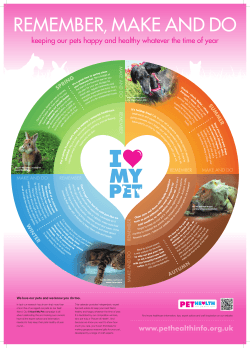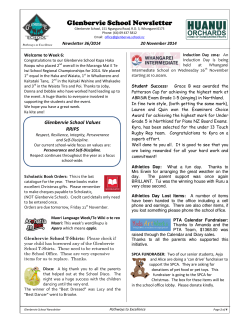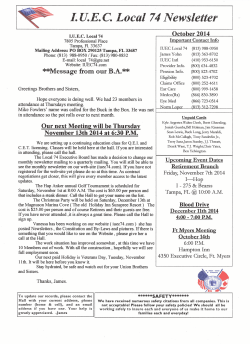
here - Be The Cure
Troubles reading the newsletter? C lick here to open in browser. BeTheC ure Newsletter - for collaborators and interested external parties - 2/2014 BTCure 3rd annual meeting September 14-16 the BTCure netw ork met for the third annual meeting in Prague. The meeting w as comprised of different meetings; first the annual Principal Investigator meeting, in w hich the important decision to set a side 0,5% of our total budget in support of the central fund w as made. The central fund makes it possible to arrange focused w orkshops in different areas and also to visit partners w ithin BTCure. If you are interested in organising a w orkshop or to visit one of our partners you can address the Work Management Board w ith a request for financial and organisational support or apply for travel exchange support. Templates for both w orkshop support as w ell as for travel are available in our internal platform. For more information on the central fund, please contact Susanne K. The second part of the meeting w as the general research meeting w here all the w orkpackages w ere presented and nice summaries from meetings and w orkshops during the year w ere presented and discussed. After this w e had break-out meetings and off-line meetings and w e w rapped it all up w ith a nice poster session and dinner. The full report from the meeting can be found here Prolongation of BTCure? In November the Management team submitted an official request to prolong the project duration by 12 months, i.e. new end date would then be March 31 2017. The reason for this request are several but to summaries, a prolongation would: - allow us to achieve the objectives of the ENSO grant; using new tools and materials that have been developed during the course of the project. A multiplex antibody analysis system: a platform that now provides the consortium with the world's best diagnostic system for antibody analysis in RA. - make it possible to fully exploit our assembled biobanks and cohort information, for example with more detailed studies on specific antibodies used in the platform, or surveillance of treatment responses and longitudinal studies. - allow us to combine these data with existing genetic and clinical data and provide us with new possibilities to predict disease onset as well as disease course, and possibly also to predict response to different therapies. The development of this informatics platform is ongoing, but we cannot use until we have the results from the multiplex antibody analysis. - allow us to use new techniques that have made it possible to use single cell transcriptomics for the analysis of synovial tissues. - allow several academic as well as industrial partners to make use of the new monoclonal antibodies that has been generated in BTC ure. The experiments that will be possible include a series of functional experiments with the various monoclonal antibodies on human cells in vitro (osteoclasts, fibroblasts, chondrocytes), transfer experiments to mice in vivo, as well as experiments with modified (mainly with changes in glycosylation) antibodies which may also possibly be used as blocking agents for potentially pathogenic antibody-mediated effector functions. - help us to continue and expand our collaboration with patient organisations. EULAR PARE meeting Our collaboration w ith the European patient organisation PARE has deepened and expanded and the development of new means for communication betw een scientists, health care and patients receives constantly more attention. This has been an explicit goal of BTCure from the beginning and w e have gradually expanded our collaboration w ith the patient organisation in Europe (EULAR/PARE). One thing that has contributed to a better mutual understanding is the active participation in the annual meetings of the tw o organisations as w ell as contributing w ith articles in the new sletters of the same. Some of the w orkshops at this years' PARE meeting w ere on communication and how the use of social media can increase the public aw areness about rheumatic diseases and all the research that is ongoing w ithin the area. Hopefully this w ill help us in communicating our w ork and results better in the future. EFPIA support available There are still many possibilities to receive EFPIA-support for both ongoing and new projects. EFPIA partners w ithin BTCure have expressed their interest in continued support but generally do not know w hich projects that are available. So please bring forw ard your ideas and suggestions for projects that w ould benefit from EFPIA support and funds! Contact Neil Gozzard at UCB, and/or Martina Johannesson (W Ps 15) or Marieke Bax (W Ps 6-9) for more information Upcoming events and workshops Suggestions for w orkshops discussed, but not decided on. Please contact the BTCure management if you have any ideas or suggestions for w orkshop topics. Suggested so far: * Tolerance/biomarkers/technologies - 2015 * PAD inhibitors - spring 2015 * Functional genomics - February 2016 * BTCure 4th annual meeting, Prague Sept 20-22 2015, We thank you all for yet a fantastic and productive year with great collaborations and we look forward to continue this successful work next year! For input and comments on the newsletter, please contact editor Susanne Karlfeldt . Forward newsletter to a colleague! Unsubscribe Postm an
© Copyright 2025



















